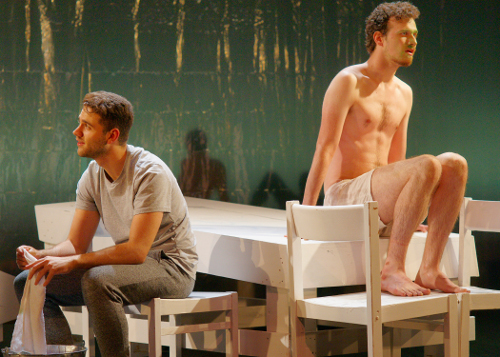
Tideline, on stage now in Toronto, is beautifully performed and not shy about politics
Tideline is a poetic, demanding play, beautifully performed at the Hart House Theatre at the University of Toronto. What seems like a simple family drama — a story in which a young man’s distant father suddenly passes and the son finds out family secrets — quickly turns into a hard-to-watch journey that takes us to a post-war desolate landscape. Written by Lebanon-born Wajdi Mouawad, translated by Shelley Tepperman and directed by Ken Gass, Tideline explores the impact of the atrocities of war on youth.
Young man Wilfred (Danny Ghantous) is taking the body of his father (Erik Mrakovcic) back to the homeland where Wilfred’s parents once hid in bomb shelters. In Wilfred’s quest to find a respectable burial spot in this place of despair, Wilfred meets a growing medley of damaged youth who have lost their own fathers, other family members, neighbours and countless strangers due to conflict. The young people band together to find the father a resting place in a land where all nearby cemeteries are jam packed with those slain.
The program indicates that Tideline contains mature content. I personally find that warnings sometimes appear to baby the audience, as if we cannot handle foul language and a bit of cigarette smoke. This warning was actually understated. The wartime violence in the young people`s memories was shockingly graphic, even though there was no blood or guts on stage.
For example, Amé (Augusto Bitter) confesses that he accidentally killed his own father after a battle, not recognizing him in the dark. Amé not only murdered him, but mutilated him and threw his body away like litter. This horrifying story is only one of many. Simone (Cassidy Sadler), Sabbé (Harrison Tanner), Massi (Kwaku Okyere) and Joséphine (Madeleine Heaven) also share terrifying experiences in which civilians do not simply die from being shot, but are shamed, ridiculed, raped and cut up. One of the young people even finds joy in knowing that Wilfred’s father’s body is intact with all its limbs, unlike the dismembered bodies of their own fathers.
The lengthy monologues gave the actors a chance to shine, and I found that Danny Ghantous’ early conversation with “Your Honour” showed that he is one to watch. His lost look and ability to plead made me feel compassion, and I was curious as to what would happen next.
The simple white set and the black, white and grey costumes never distracted us from the words. With Tideline being emotionally demanding and difficult to follow, the plain stage was a relief.
Unfortunately, Mouawad had written in an imaginary friend (Angela Sun) who was played ably. This friend was a movie director in Wilfred’s mind. But watching seven or eight characters on the stage suddenly make a film got me confused. I had trouble with the abrupt change in context. The whizzing movement and noisiness, representing Wilfred’s racing thoughts, made the stage seem crowded at times, and I personally found it hard to follow the action.
The final moments of Tideline are visual mastery. The father slowly moves farther and farther into the sea, anchored by phone books filled with names of the dead. He is sent off to rest by the young people who are lined up in a row and standing on chairs, as if they are bidding him farewell with ceremony. This image sent shivers down my spine.
As Syrian refugees search for a place to call home, crossing dangerous seas to find safety, Tideline is an important play for Canadians. See this play if you want to see a serious, well-performed work with a political edge that sheds light on issues of war, displacement and the refugee experience. I’m glad I did.
Details
- Tideline plays from September 16 to October 1, 2016 at Hart House Theatre (7 Hart House Circle)
- Showtimes Wednesday to Saturday at 8 pm; Saturday, October 1 at both 2 pm and 8 pm
- Running time: approximately 2 hours and 30 minutes with one intermission
- The show contains haze effect, scenes with mature content and coarse language
Photo of Danny Ghantous and Erik Mrakovcic by Scott Gorman.
